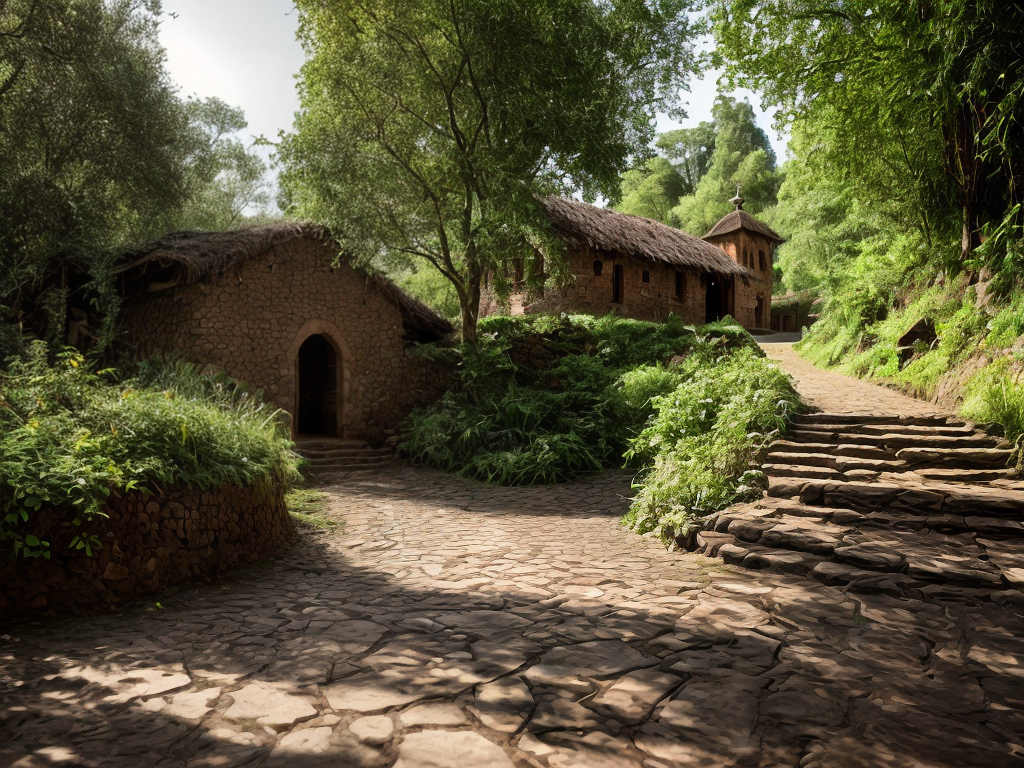As I stepped into the vibrant streets of Lalibela, I was instantly captivated by the air of anticipation and devotion that filled the air. Little did I know that I was about to embark on a spiritual journey like no other, exploring the rich tapestry of religious festivals that have made this Ethiopian town famous. From the annual Timkat celebration to the mesmerizing Meskel Festival, join me as I delve into the heart of Lalibela’s sacred traditions.
The Origins of Lalibela’s Festivals
Why were Lalibela’s festivals established? The origins of these religious festivals can be traced back to ancient times, deeply rooted in the rich cultural heritage of Ethiopia. These festivals hold immense cultural significance for the people of Lalibela and serve as a way to celebrate their religious beliefs and traditions. The festivals are a time for the community to come together, to reflect on their faith, and to honor their ancestors. They are also a way to showcase the unique architecture and craftsmanship of the famous rock-hewn churches that Lalibela is renowned for. The origins of these festivals may be shrouded in history, but their cultural significance continues to resonate with the people of Lalibela, ensuring that these traditions endure for generations to come.
The Holiest Sites in Lalibela
I have always been fascinated by the ancient rock-hewn churches of Lalibela, which are considered the holiest sites in the region. These remarkable structures, carved out of solid rock centuries ago, hold great spiritual significance for the Ethiopian Orthodox Church and attract pilgrims from all over the world. The rituals and ceremonies performed at these sacred sites are deeply rooted in tradition and play a vital role in preserving Lalibela’s rich cultural heritage.
Ancient Rock-Hewn Churches
During my visit to Lalibela, I found myself in awe of the ancient rock-hewn churches, which are considered the holiest sites in the area. These remarkable structures, carved out of solid rock centuries ago, showcase the exceptional talent and dedication of the craftsmen who built them. The rock hewn churches of Lalibela are a testament to the rich religious heritage of Ethiopia and a marvel of religious architecture. Here are four reasons why these churches are truly extraordinary:
- Ingenious Engineering: The churches were meticulously carved from the ground, with each stone fitting perfectly together to create intricate and majestic structures.
- Spiritual Significance: These churches are not merely architectural wonders, but also serve as active places of worship for devout Christians.
- Preservation of Tradition: The rock hewn churches have remained intact for centuries, preserving the ancient traditions and practices of the Ethiopian Orthodox Church.
- UNESCO World Heritage Site: Recognized for their cultural and historical significance, these churches have been designated as a UNESCO World Heritage Site, attracting visitors from around the globe.
Visiting these rock-hewn churches in Lalibela is a truly awe-inspiring experience that allows one to witness the beauty of religious architecture and the devotion of the Ethiopian people.
Spiritual Significance and Rituals
The spiritual significance and rituals associated with the holiest sites in Lalibela are an integral part of the religious experience one encounters when visiting these ancient rock-hewn churches. The churches of Lalibela hold immense spiritual value for the Ethiopian Orthodox Christians, who consider them to be sacred places of worship. The spiritual practices and cultural traditions observed at these sites reflect the deep-rooted faith and devotion of the local community. Pilgrims engage in various rituals such as prayer, fasting, and singing hymns as a way to connect with the divine. These rituals are not only important for individual spiritual growth but also foster a sense of community and unity among the worshippers. The spiritual significance and the adherence to these cultural traditions make Lalibela a truly unique and sacred destination for religious pilgrims.
Cultural Heritage Preservation
Preserving the cultural heritage of Lalibela’s holiest sites is a crucial endeavor for ensuring their continued significance and relevance. As a community, we must engage in efforts to protect and maintain these sacred places for future generations to experience and appreciate. Here are four key reasons why cultural heritage preservation and community engagement are essential:
- Historical Value: Lalibela’s holiest sites are a testament to the rich history and architectural brilliance of ancient Ethiopia.
- Spiritual Significance: These sites hold immense spiritual importance to the local community and are central to their religious practices.
- Tourism and Economy: Lalibela’s holiest sites attract tourists from all over the world, contributing to the local economy and livelihoods of the community.
- Identity and Pride: Preserving these sites helps to strengthen the cultural identity of the local community and instills a sense of pride in their heritage.
The Annual Timkat Celebration
The Annual Timkat Celebration in Lalibela holds immense historical significance, as it commemorates the baptism of Jesus Christ in the Jordan River. The celebration is marked by a series of traditional rituals and customs, including processions, prayers, and the reenactment of the baptismal ceremony. This vibrant festival not only strengthens the faith of the local community but also attracts pilgrims and tourists from around the world, providing a significant boost to the local economy.
Historical Significance of Timkat
Every year, I eagerly anticipate the vibrant and culturally rich celebration known as Timkat, which holds immense historical significance in Lalibela. This ancient festival has its historical origins dating back to the 4th century, making it one of the oldest religious celebrations in Ethiopia. Timkat is deeply rooted in the cultural traditions of the Ethiopian Orthodox Church and commemorates the baptism of Jesus in the Jordan River. The festival is marked by colorful processions, joyful singing and dancing, and elaborate rituals. It is a time when the local community comes together to reenact and honor this important event in their religious history. Timkat not only serves as a religious observance but also as a time of unity, reflection, and renewal for the people of Lalibela.
Traditional Rituals and Customs
During the Annual Timkat Celebration in Lalibela, I actively participate in the traditional rituals and customs. The atmosphere is vibrant with the sounds of traditional music filling the air. The rhythmic beats of drums and the melodic tunes of the masenqo create a sense of unity and joy among the participants. As I join the procession, I am adorned in festive attire, wearing the traditional white cotton garments known as shamma. The celebrations begin with a colorful parade, led by the priests carrying symbolic replicas of the Ark of the Covenant. The rituals include prayers, blessings, and the symbolic baptism in the river. It is a truly immersive experience, connecting me to the rich cultural traditions and deep spirituality of Lalibela.
Impact on Local Community
Attending the Annual Timkat Celebration in Lalibela, I witnessed the profound community impact of this religious festival. The Timkat Celebration not only serves as a spiritual event, but it also plays a crucial role in the local community’s economic growth and social cohesion. Here are four key ways in which the festival impacts the community:
-
Economic Impact: The influx of pilgrims and tourists during the Timkat Celebration brings a significant boost to the local economy. Hotels, restaurants, and small businesses thrive during this time, providing employment opportunities and stimulating economic growth.
-
Social Cohesion: The festival is a time for the community to come together and celebrate their shared faith. It strengthens bonds among neighbors, friends, and family members, fostering a sense of unity and belonging.
-
Cultural Preservation: The Timkat Celebration showcases the rich cultural heritage of the Ethiopian Orthodox Church. Through traditional rituals, music, and dance, the festival helps preserve and pass on these customs to future generations.
-
Community Development: The funds generated from the festival are often reinvested into community development projects. These include building schools, improving infrastructure, and providing healthcare services, which benefit the entire community long after the celebration ends.
The Annual Timkat Celebration in Lalibela not only provides a spiritual experience but also leaves a lasting impact on the local community, both economically and socially.
The Meskel Festival: Finding the True Cross
I witnessed the discovery of the True Cross during the Meskel Festival in Lalibela. The festival is a celebration of the finding of the True Cross by Empress Helena, the mother of Constantine the Great. It is a deeply spiritual event that brings together thousands of pilgrims from all over Ethiopia. The highlight of the festival is the lighting of a large bonfire, called the Demera, which symbolizes the fire used by Empress Helena to locate the True Cross. The bonfire is lit in a carefully choreographed ceremony, accompanied by prayers and hymns. It is a truly awe-inspiring sight to witness the flames illuminating the night sky, and the joy and devotion of the pilgrims as they celebrate the discovery of this sacred relic. The Meskel Festival is a testament to the enduring rituals and customs that have been passed down through generations, preserving the rich religious heritage of Lalibela.
The Genna Festival: Celebrating Christmas in Lalibela
As a witness to the vibrant religious traditions in Lalibela, I found myself immersed in the spirit of the Meskel Festival, and now I turn my attention to another significant celebration, the Genna Festival, which commemorates the birth of Jesus Christ. The Genna Festival, also known as Ethiopian Christmas, is a joyous and sacred time in Lalibela. Here are four fascinating Genna festival traditions that make Lalibela’s Christmas celebration truly unique:
-
Midnight Mass: On the eve of Genna, thousands of pilgrims gather at the rock-hewn churches of Lalibela for a solemn and enchanting midnight Mass.
-
Candle Lighting: Pilgrims light candles and sing hymns as they make their way through the dark passages and tunnels connecting the churches, creating a magical atmosphere.
-
Traditional Games: After the religious ceremonies, locals and visitors engage in traditional games like Genna, a form of hockey, and Yegena Chewata, a game similar to hockey played with a curved stick and a small ball.
-
Feast of Fasting: Following the midnight Mass, families break their fast with a feast of traditional Ethiopian dishes, such as Doro Wat and Injera, symbolizing the joyous birth of Jesus.
The Genna Festival in Lalibela is a time of deep spirituality, festive celebrations, and community bonding. It is a truly remarkable experience that showcases the rich cultural heritage of this ancient Ethiopian town.
The Fasika Festival: Easter in Lalibela
During the Fasika Festival, amidst the vibrant religious traditions in Lalibela, I found myself immersed in the joyous celebration of Easter. The Fasika Festival is a time when the entire community comes together to commemorate the resurrection of Jesus Christ. The streets are filled with colorful processions, as people sing hymns and carry crosses, symbolizing their faith. The atmosphere is electric, with the sound of drums and the smell of incense filling the air. One of the most exciting parts of the festival is the traditional Ethiopian coffee ceremony, where families gather to share a cup of coffee and break bread together. It is a time of reflection, gratitude, and unity, as people come together to celebrate the Easter traditions that have been passed down through generations.
The Feast of Saint George: Lalibela’s Patron Saint
Amidst the religious festivities in Lalibela, the Feast of Saint George holds a special place as the annual celebration of the town’s patron saint. It is a vibrant and joyous occasion that brings together locals and visitors alike to honor Saint George and his significance in Lalibela’s religious traditions. Here are four reasons why the Feast of Saint George is a must-see event in Lalibela:
-
Lalibela’s religious processions: During the feast, the streets of Lalibela come alive with colorful processions, as priests, monks, and pilgrims march through the town, carrying sacred relics and chanting hymns.
-
Saint George’s symbolism: Saint George is revered as a symbol of courage, faith, and victory. His feast day is an opportunity for the community to reflect on these values and seek his intercession for protection and blessings.
-
Cultural immersion: Attending the Feast of Saint George allows visitors to experience the rich cultural heritage of Lalibela, as they witness traditional dances, music performances, and participate in local customs.
-
Spiritual significance: For the devout, the feast offers a chance to deepen their spiritual connection with Saint George and gain a deeper understanding of Lalibela’s religious traditions.







